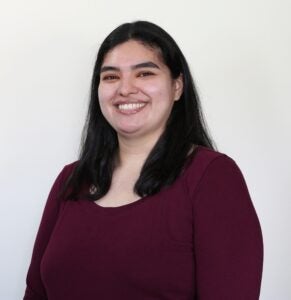Personal Information
Name: Nikole Tamayo
Education: Bachelor’s of Science in Chemistry, ACS Certified in Biochemistry
Minor in Biology, Southern Oregon University
From: Las Vegas, NV
Joined the David Lab: January 2020
Enjoys outside of lab: Video games, bullet journaling, and hiking
Research in the David Lab:
In DNA, guanine is the most susceptible to oxidation and its oxidation product is 8-oxo-7,8-dihydro-oxoguanine (OG). The Hoogsteen face of OG is similar to thymine (T) so during replication adenine (A) is misincorporated and after another round of replication results in a G:C to T:A transversion mutation. MutY is a DNA base excision repair enzyme that removes A from OG. Part of the enzyme that is theorized to recognize DNA lesions and facilitate repair is the iron-sulfur cluster. Nikole is investigating the role of the iron-sulfur cluster by examining “clusterless” enzymes, enzymes that do not contain the iron-sulfur cluster based on sequence homology. The lack of the iron-sulfur cluster suggests that it may not be necessary for DNA repair and recognition.
Previous Research Experience:
Nikole participated in two summer research internships while attending Southern Oregon University. At the Medical University of South Carolina, Nikole learned about hematopoietic stem cells and their ability to differentiate into many different cell types including blood cells, mast cells, and osteoclasts. Nikole learned how to culture specialized cells and image them, process tissues, section tissues, immunohistochemistry staining for tissues and stem cells, and bone marrow extraction from mice and staining for flow cytometry. At the University of Arizona, Nikole learned about short and long cell signaling in plants how errors in the clavata-wuschel pathway can affect the meristem and the fruit of plants in Arabidopsis or tomatoes. Nikole learned how to extract plant DNA, create polymerase chain reaction methods for specific primers, and interpret and image gels from gel electrophoresis. For Nikole’s undergraduate research at Southern Oregon University, she investigated the stability of epinephrine under various environmental conditions. She adapted a previously published method on quantifying the degradation products of epinephrine using high performance liquid chromatography and how to analyze the results to yield relative concentrations of epinephrine and its degradation products.
